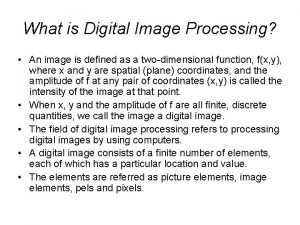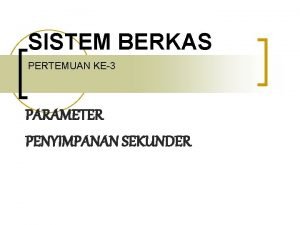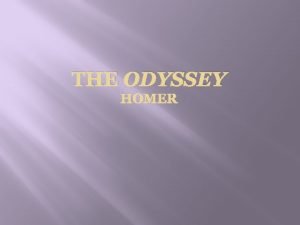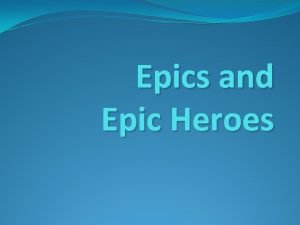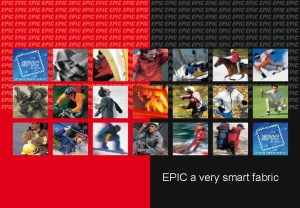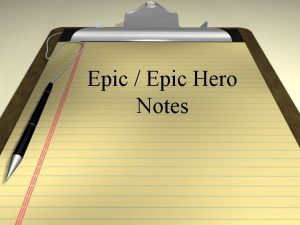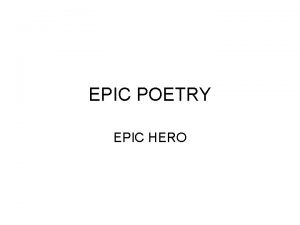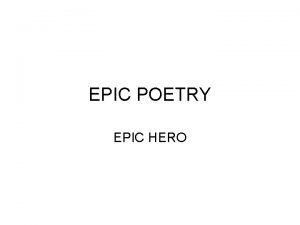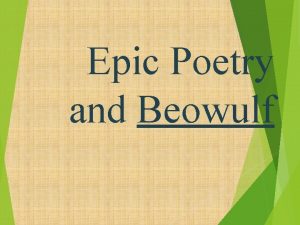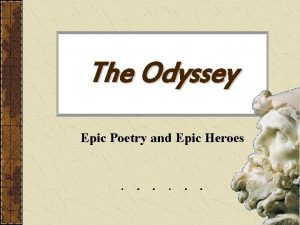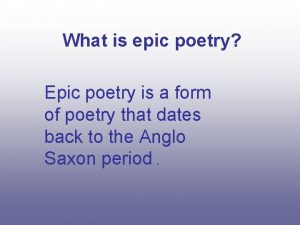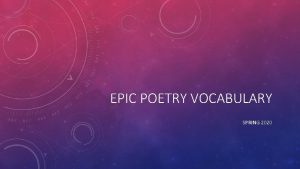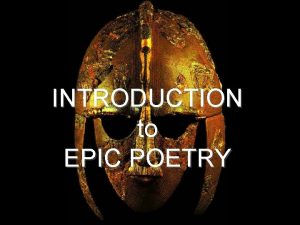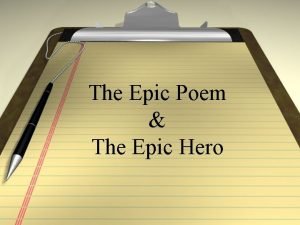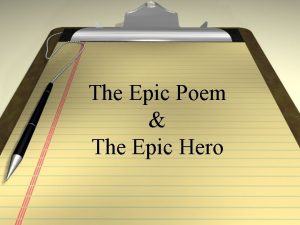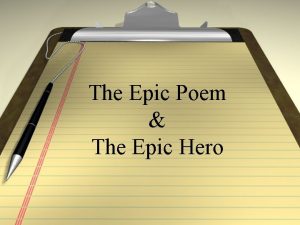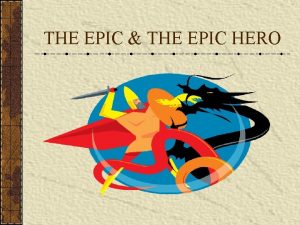EPIC POETRY History The epic poetry spanned from















- Slides: 15

EPIC POETRY

History The epic poetry spanned from thousands of years B. C. to the 1600’s A. D. Began as oral tales sung by bards (poetic singers) First epic poem was the myth of Gilgamesh. John Milton’s poems “Paradise Lost” and “Paradise Regained” are some of the last epic poems of the era. Many are based on the 4 functions of myth.

4 Functions of Myth 1. Metaphysical: explains beliefs in gods, fate, as well as other things not of this world 2. Cosmological: explains beliefs in how things were created. 3. Sociological: passes down morals and ethical of a moral society. 4. Pedagogical: leads through a rite of passage through the various stages of life.

Characteristics of the Hero Usually of noble birth or has been knighted. Usually a male with either exceptional physical strength, or mental acuity. Performs superhuman tasks (fighting monsters, etc. ). Generally has a mentor and helper. Risks life to accomplish his task.

Characteristics of an Epic Reflects the values of the culture Setting is vast (two of more countries) Formal diction and serious tone Long, formal speeches and soliloquies Contains the supernatural (monsters, gods, forces) Timeless values (courage, loyalty, honor) Universal themes (Good/Evil, Life/Death, Love)

More Characteristics of an Epic Tends to follow older structure. Generally written in blank verse. Follows the stages of the Monomyth.

The Monomyth All epic poetry and mythology follows this pattern. It consists of three phases: Departure, Initiation, and Return

Departure The hero is informed of a problem, and discovers that they can do something to fix the problem. They leave their home and journey to fix the problem.

Stages of the Departure Someone or something of importance goes missing, or a supernatural disaster occurs. Hero is generally warned not to pursue the situation, or may be asked to take action. The hero violates the warning, or accepts the request. The hero embarks on the quest.

Initiation This phase consists of the many adventures and trials of the hero on their quest to solve the problem. The initiation usually will be the majority of the poem. It culminates with the hero confronting the problem, usually with physical combat.

Stages of the Initiation Journey to the destination Experiences obstacles along the way. Donor helps find missing object/person, or locates lair of villain/monster. Gains magical item/powers. Villain/monster is defeated.

Return This phase focuses on the hero’s return. The hero usually returns home with new knowledge or skills that they did not possess before. This phase may not appear if the hero died as a martyr (died in order to accomplish his goal).

Stages of the Returns to home. May be unrecognized (physical change). Task is completed, the hero is recognized for his achievement. May marry and/or ascend the throne.

Works that will be Taught Beowulf (around 4 oo A. D. ) Sir Gawain and the Green Knight (1300’s) Paradise Lost (1667) by John Milton.

Works Cited Perry, D. (2006, May 18). The Influence of literature and myth in videogames [Web log message]. Retrieved from http: //ps 2. ign. com/articles/709152 p 1. html (page 4) Merriman, C. D. (2008). John Milton. Retrieved from http: //www. online-literature. com/milton/
 Her life spanned years of incredible change
Her life spanned years of incredible change Spanned volume
Spanned volume Zooming and shrinking in digital image processing
Zooming and shrinking in digital image processing Contoh spanned variable blocking
Contoh spanned variable blocking Homer's first epic is the primary model for the epic of
Homer's first epic is the primary model for the epic of Why do epic heroes have supernatural powers
Why do epic heroes have supernatural powers Hình ảnh bộ gõ cơ thể búng tay
Hình ảnh bộ gõ cơ thể búng tay Ng-html
Ng-html Bổ thể
Bổ thể Tỉ lệ cơ thể trẻ em
Tỉ lệ cơ thể trẻ em Gấu đi như thế nào
Gấu đi như thế nào Tư thế worms-breton
Tư thế worms-breton Alleluia hat len nguoi oi
Alleluia hat len nguoi oi Các môn thể thao bắt đầu bằng tiếng chạy
Các môn thể thao bắt đầu bằng tiếng chạy Thế nào là hệ số cao nhất
Thế nào là hệ số cao nhất Các châu lục và đại dương trên thế giới
Các châu lục và đại dương trên thế giới


